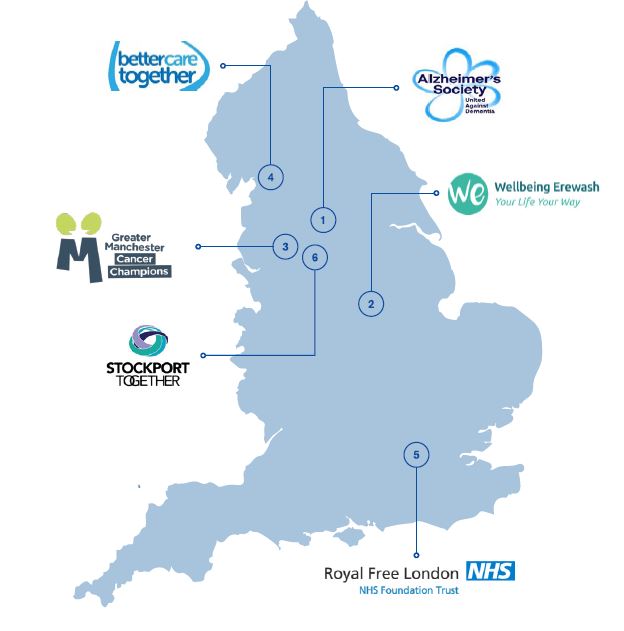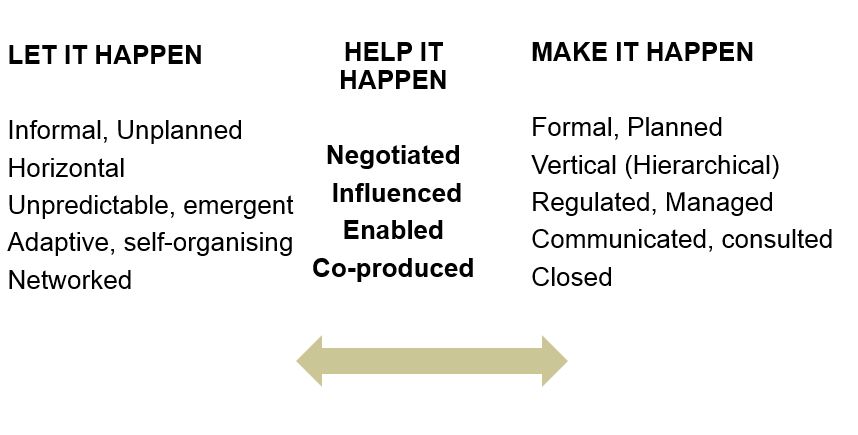Today sees The RSA and The New Economics Foundation launch ‘Theory into Practice', the final report of the Health as a Social Movement programme. In the report, we outline eight principles for releasing the energy for change that exists in social movements for health. This will be key to ensuring the NHS of the future can be effective in tackling health inequalities, purposeful in the way that it invests in prevention and can be community-led in its approach to change.
Download the report - Health as a Social Movement: Theory into Practice (PDF, 1.7MB)
Health as a Social movement from The RSA on Vimeo.
Throughout the programme we have discovered that movements of people, working together, define the success of a modern health service. From the hospice movement arising over a century ago, to more recent viral social media initiatives campaigning to increase research into rare diseases such as amyotrophic lateral sclerosis (ALS); social movements have consistently been a powerful pressure on health systems.
Health professionals are increasingly aware that social factors - such as the quality of the houses we live in, the work we do, the relationships we share - are accurate predictors of our health and longevity. Learning how health movements can promote ‘social models’ of health, that respond to these social factors, can help services such as the NHS respond to the daunting challenges facing healthcare systems.
This highlights a paradox within the operating model of the NHS: acute pressure on services necessitates a greater focus on preventing illness and achieving better value, but simultaneously makes it more difficult to do this effectively and at sufficient scale.
The Health as a Social Movement (HASM) programme, working with pilot sites across England, highlights a growing inventiveness within pockets of the UK health system, and offers a response to these pressing challenges.
NHS England’s Five Year Forward View (FYFV), refers to the need to empower communities, and commits to ‘get serious about prevention’, describing the NHS as a ‘social movement’. The RSA and NEF have worked with projects in six areas to develop networks which have supported local social movements and campaigns to scale up action to prevent ill-health. The strength of the programme has been the diversity of interventions and whether that has been in the care home, workplace, through the arts or in a GP surgery, we have witnessed how the NHS can be a platform for citizen-led health improvement.
To help spread this success we identified eight key principles which we hope will inform the practice of those working in healthcare.
The 8 key principles outlined in our report 'Theory into Practice' are:
- Act early: connect and mobilise citizens to develop a shared purpose and take collective action.
- Shift control: enable people to have more access to, and more control over, the resources in their community that impact on health and wellbeing.
- Collaborate widely: join forces with local anchor institutions, local CVS organisations and other public services.
- Share power: form partnerships between citizens and professionals, pooling different kinds of knowledge and experience.
- Change culture: work to change culture and practice within state and civil society organisations.
- Growing from local: make sure decisions and actions are rooted in local experience and build on the assets and experiences of the community.
- Building momentum: learn as you go and use every opportunity to spread good practice
- Bringing people together: Connect and mobilise citizens to build knowledge, help each other, develop a shared purpose and then take collective action in their communities to help each other stay well
Download the report - Health as a Social Movement: Theory into Practice (PDF, 1.7MB)
Better value healthcare through community-centred approaches
Thinking about how the energy created from movements of people as a part of “adaptive systems” to support the health service has a long history; featuring in The NHS Modernisation Agency’s ‘Towards a Million Change Agents’ (2004) and Sir J. A Muir Grays’ ‘Better value health care revolution’ (2007).
However, the ‘spirit’ of social movements – bottom-up, community-led campaigns for change - means they do not easily fit into a public service template.
The promise and energy that working with community groups and health activists can provide much-needed optimism in a time of acute pressure on services, and they can capture the essence of the change required to tackle health conditions that are largely socially determined. But earnest attempts by managers and public servants to work with social movements can produce misguided action and be perceived as out-of-touch with the day-to-day reality of people working in hospital trusts, care homes or GP surgeries.
The six ‘vanguard’ sites

- The Royal Free London Foundation Trust has been working with its lowest paid staff to improve engagement with existing occupational health initiatives as well as increase physical and mental health through weekly walking groups; Mount Snowdon trips; healthy cooking classes; climbing classes and a Christmas social including families. This work to build momentum has resulted in a reduction in sickness absence for this group of staff over the period; a comparator group of staff not engaged have seen absences increase. Read more: A sustainable NHS: Start with the workforce
- Greater Manchester Cancer vanguard had recruited 2000 cancer champions across the city. Mortality rates for cancer in the region are 10% higher than the national average. Their commitment to act early by recruiting champions via cancer charities and through the family members of people with a diagnosis, is truly innovative by putting people with lived experience of cancer at the heart of cancer prevention. Read more: Cancer champions tackle health inequalities in greater manchester
- Wellbeing Erewash has been working across 10 schools in the region with the ‘Art of Brilliance’, an organisation providing personal resilience training and positive psychology strategies in schools. It has also collaborated widely, including with the voluntary sector via Erewash CVS to recruit a network of community connectors that can signpost to local services when connectors believe there are early signs of poor health or unmet support needs. Read more: Connecting communities in Derbyshire
- Airedale Social Movement is working with eight care homes in and around Leeds, proving that the health care system can work effectively with the care home sector, if given the right opportunity. They have collaborated widely to produce a community engagement toolkit for care home managers, and connected secondary schools, pupil referral units and colleges so that they become embedded into the daily life of care homes. Read more: Reimagining the care home
- Better Care Together, Morecambe Bay has been working to change culture in commissioning practices across the public sector, especially in GP surgeries. They have used citizen participation experts ‘The Art of Hosting’ to train leaders as diverse as the Chief Constable of Cumbria Police to the Chief Operating Officer of Morecambe Bay CCG. Read more: What does it take to be a community-led GP?
- Stockport Oldham and Tameside has been growing from the local by developing local ‘sparks’ catalyst funding to support grass-roots initiatives, linking up food and art groups across the three boroughs who want to help end loneliness and social isolation in their communities. Read more: Greater Manchester: Restoring regenerative public service
The NHS
Within pockets of the NHS – as in the wider public sector – we find a huge appetite to deliver the kinds of improvements and ambitions such as those set out in the Five Year Forward View. The RSA advocates an approach to public service reform that we refer to as ‘helping it happen’ (see our paper Releasing the Energy for Change). Those in power seeking to achieve population health outcomes should recognise that simply ‘letting it happen’ is likely to lead to movements falling short of their potential. Community-led, emergent, self-organised movements at the ‘grassroots’ level are most effective when they influence the existing power structure.
This potential is huge: think about if the NHS had listened to HIV campaigners long before they had to take direct action to demand adequate provision. So health agencies, bodies and service managers should seek to enable, negotiate and influence social movements in health. But to harness the energy for change that courses through social movements, public services can’t ‘make it happen’. Social movements in health can’t be conjured through formal planned and professionalised initiatives, using the familiar toolkit of public management hierarchies.

For some leaders working in health care, the contrasting characteristics of these approaches will be familiar. However, having travelled up and down the country working with services that have been charged with working to embed prevention in all their work, our eight principles are an instructive and stretching target.
Download the report - Health as a Social Movement: Theory into Practice (PDF, 1.7MB)
Find out more about the Health as a social movement programme
Related articles
-
A social justice cause for the 2020s – reining in health spending
Anthony Painter
Anthony Painter argues that the state expansionists will win over small statists as healthcare expenditure is destined to increase. But their victory may be a Pyrrhic one unless the growth can be limited so better support can also be given to housing, economic security, education and lifelong learning.
-
Did Bevan's bedpan test set the NHS on the wrong track?
Ed Cox
Ed Cox, Director of Public Services and Communities, argues that the NHS needs a more devolved approach in the decade ahead.
-
Cancer Champions tackle health inequalities in Greater Manchester
Becca Antink
A project demonstrating how citizens have valuable skills, community-specific knowledge and personal experiences which they can utilise to drive positive change for better health in their communities.




Join the discussion
Comments
Please login to post a comment or reply
Don't have an account? Click here to register.
I think we must not ignore 2 very important things - legislation (e.g. sugar tax) and technical advances which will revolutionize the way everything happens. .
There's a lot of exciting and challenging new thinking happening which so often seems to be aimed at or retained by the world of business, when the reality may be that it should be more broadly welcomed as "societal". Organisations - clusters of people with a common purpose - are evolving and traditional thinking around management and leadership is struggling to keep up, never mind cope with the future. Let's not be too 'academic' about this and look for models and strategies to explain or ease processes that still need to emerge.
An enterprising culture of "Let it happen" will look like a scary thing to those who hang on to hierarchies, outputs and the need for prescriptive interventions, rather than simply focus on outcomes. The solutions which will begin to make a difference already exist within the communities of stakeholders at which they are aimed. The 'trick' is enabling and supporting these communities to become active, independent, learning, communities of practice who can build solutions which add value, not tick boxes.
There is no silver bullet; no "one size fits all" training. We need to learn not be taught, and that learning will by doing.